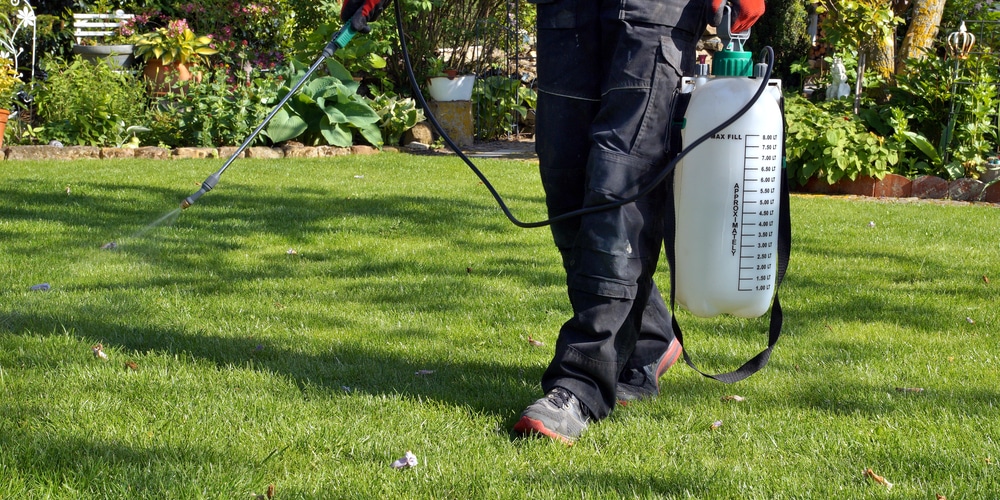There are many herbicides on the market to choose from when it comes to weed control. Two of the most popular herbicides are quinclorac and Tenacity. Both of these herbicides have pros and cons, and it can be challenging to decide which one is right for your needs. In this article, we will compare and contrast quinclorac vs Tenacity so that you can make an informed decision about which one is best for you!
Quinclorac vs Tenacity Components
Quinclorac 75 DF is a herbicide concentrate containing 75% quinclorac. It is a broad-spectrum herbicide that controls annual and perennial weeds in ornamentals, turf grasses, and crop production. Quinclorac 75 DF is effective against both emerged and seedling stages of weeds.
It has a systemic mode of action that translocate throughout the plant to control even the toughest weeds. Quinclorac 75 DF also provides residual control of weeds, preventing new weed growth for up to 6 weeks.
Tenacity is a herbicide concentrate that contains 40% Mesotrione, a selective herbicide that controls broadleaf weeds and grasses. The active ingredient in Tenacity, Mesotrione, works by inhibiting the photosynthetic process in plants, causing them to turn yellow and die.
Tenacity is most effective when applied to young, actively growing weeds. It can be used on both cool-season and warm-season turf grasses and is safe for use around people and pets.
Tenacity is rainfast within one hour of application and will not harm beneficial insects or earthworms. With its long-lasting results and user-friendly application, Tenacity is an excellent choice for anyone looking to control broadleaf weeds and grasses.
Difference Between Quinclorac And Tenacity
Tenacity and Quinclorac are both herbicides that can kill a variety of weeds and pest grasses. However, because not all turf grasses are suitable for use with Tenacity, determining the appropriate weed killer spray for your lawn is essential. Quinclorac is relatively safe for most turf grasses, although Tenacity might harm some of them.
St. Augustine, Bahiagrass, Centipede grass, Dichondra, and several kinds of Bentgrass are harmed by Quinclorac. Bermuda grass is damaged by tenacity, as is Zoysia, Bentgrass and Seashore Paspalum, . As a consequence, when these herbicides are used on the wrong type of grass, they will cause the leaves to turn yellow and die.
Quinclorac is a herbicide that is primarily used as a post-emergent weed killer. This means it is most effective at killing weeds that have already sprouted rather than preventing new weeds from germinating. However, quinclorac can also be used as a pre-emergent herbicide, stopping new weeds from sprouting. Quinclorac works by inhibiting the growth of certain essential enzymes for plant cell division.
Tenacity herbicide is a selective post-emergent and pre-emergent weed killer. It destroys over 46 weeds, including crabgrass, dandelions, and clover, as well as perennial grasses like wheatgrass. Tenacity also functions as a pre-emergent by preventing new weeds from growing.
Lastly, if you’re looking for an herbicide that effectively kills mature weeds and crabgrass, quinclorac is a good option. This herbicide works by inhibiting the growth of plants, and it is particularly effective at killing mature weeds and crabgrass.
Can You Mix Tenacity And Quinclorac?
The answer is no. You should not mix Tenacity and Quinclorac. These herbicides are both effective, and mixing them will not improve their efficacy. It may even decrease the effectiveness of both herbicides. Mixing these two herbicides can increase the risk of damage to your turf grasses.
Which is Better: Tenacity Or Quinclorac?
The answer to this question depends on what you’re looking for in an herbicide. If you’re primarily concerned with preventing new weeds from sprouting, Tenacity is a better option. However, quinclorac is a better choice if you’re looking for an herbicide that will kill both mature weeds and crabgrass.
Quinclorac vs Tenacity: Conclusion
Tenacity and quinclorac are both effective herbicides that can kill a variety of common weeds and pest grasses. However, choosing the right weed killer spray for your lawn is important, as not all turf grasses are safe for use with either herbicide.
No matter which herbicide you choose, it’s essential to read the label carefully and follow the instructions for use. Additionally, test the herbicide on a small patch of grass before applying it to your entire lawn. This will help you avoid damaging your turf grasses.

